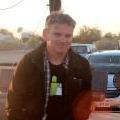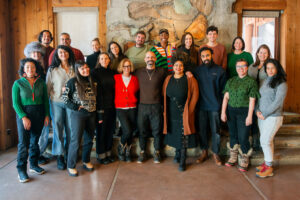Jerry Rothwell
Jerry Rothwell is a British documentary filmmaker. He joins Film Forward in Imperial Valley to screen and discuss his latest film Town of Runners.
If in Mexicali, there’s a feeling of being contained by the border fence, that most roads have to end there (see my last Film Forward blog), on the other side of the US border straight highways stretch away into the desert. When we head back into California to show Town Of Runners in Southwest High School, on the edge of El Centro, there’s a different atmosphere, a sense amongst the students that, if they want to, they can and probably will take those roads one day to better opportunities further north.
“It’s just like El Centro” says one “there’s not much here and the road can take you on to somewhere bigger.” We discuss whether that’s going to be good or bad for Bekoji. “It’s both”, they suggest. Roads bring opportunities, but they mean people move away and lose the things they’ve grown up with, which neatly sums up the ambiguities of development for places like Bekoji and El Centro, and also for the people who’ve migrated from their homes to try and cross the border at Mexicali.
Later we travel out along one of the roads from El Centro towards the Salton Sea, once a thriving tourist resort, now a surreal, bare landscape and the location for Alma Har’el’s fine documentary Bombay Beach. We’re heading for Slab City, an area of the southern California desert which takes its name from the concrete foundations left over from World War II training barracks. It’s become a gathering point for people escaping to live off-grid, mostly in RVs, shacks and trailers, which circle the central slabs like pioneers’ wagons. There’s no electricity or running water in this improvised community; “It’s a place that’s pretty much next to the bottom.” says one resident in a film made by VBS.tv. “There’s no place to fall after this.”
Most residents wouldn’t see it as falling, but as “the last free place”. Dropping out creates its own opportunities. We pass by Salvation Mount, an astonishing piece of outsider art created over 30 years by Leonard Knight, which probably couldn’t have been created anywhere else. Arriving in Slab City we meet Bill, who’s set up The Range, a performance area surrounded by an array of different kinds of seats; old sofas, car seats, a row of theatre seats, wooden and plastic chairs. Every Saturday night there’s talent show of live music and performance. Far from being the end of the road, Slab City has enabled Bill to reinvent himself. “In San Diego I was on the streets. Here I’m the manager of a theatre and a leader in the community,” he said. Bill has become a humble impresario, nurturing the creativity of anyone who turns up to his makeshift stage.
There’s maybe 20-30 people who’ve come to the screening. The generator starts up, night falls and under a clear and starry sky, up on the screen, a 14-year-old Ethiopian girl who’s never left her own country, talks about her life to a group of Americans, whose journeys to where they are now are no doubt as difficult and eventful as hers. I can never shake the astonishment in screenings like this—that the story of a girl I met in a place that at the time seemed to me so remote, is projected half a world away, to a place perhaps equally unique but totally different. It’s always a reminder of the extraordinary power of film, the Empathy Machine, as Mark Cousins calls it in The First Movie.
The dialogue this creates is at the heart of these Film Forward screenings. It’s been fascinating to show Town of Runners alongside Stacey Peralta’s Bones Brigade—two very different films, but both about young people who find something they love to do and follow it in ways that change their lives. One Mexican student I was talking to about this commented that not only were the films about dreams, but that watching them felt motivating, a kind of vicarious dreaming which might set you off on your own journey.
When we show the film back over the border again in Mexicali, a local athletics coach brings a group of children from his running club. They talk about why they run (“I like running because I like the feeling of being tired’ says one). Tomorrow they are competing in a 4k race, and perhaps while running they’ll be imagining they are Ethiopians.
Only connect.







